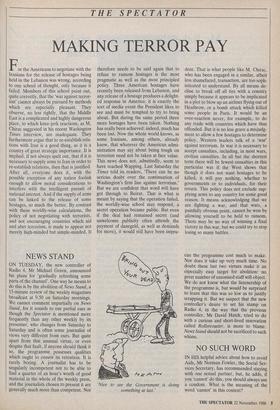THE SPECTATOR
MAKING TERROR PAY
For the Americans to negotiate with the Iranians for the release of hostages being held in the Lebanon was wrong, according to one school of thought, only because it failed. Members of this school point out, quite correctly, that the 'war against terror- ism' cannot always be pursued by methods which are especially pleasant. They observe, no less rightly, that the Middle East is a complicated and highly dangerous place, to which knee-jerk reactions, as M. Chirac suggested in his recent Washington Times interview, are inadequate. They furthermore argue that to re-establish rela- tions with Iran is a good thing, as it is a country of great strategic importance. It is implied, if not always spelt out, that if it is necessary to supply arms to Iran in order to re-establish relations, then that is justified. After all, everyone does it, with the possible exception of any nation foolish enough to allow moral considerations to interfere with the intelligent pursuit of national interest. And if the supply of arms can be linked to the release of some hostages, so much the better. By contrast with these worldly-wise calculations, the policy of not negotiating with terrorists, and not encouraging countries which aid and abet terrorism, is made to appear not merely high-minded but simple-minded. It therefore needs to be said again that to refuse to ransom hostages is the most pragmatic as well as the most principled policy. Three American hostages have recently been released from Lebanon, and any release of a hostage produces a delight- ed response in America: it is exactly the sort of media event the President likes to see and must be tempted to try to bring about. But during the same period three more hostages have been taken. Nothing has really been achieved: indeed, much has been lost. Now the whole world knows, as some Iranians, among others, already knew, that whatever the American admi- nistration may say about being tough on terrorism need not be taken at face value. This news does not, admittedly, seem to have reached Wapping. Last Saturday the Times told its readers, 'There can be no serious doubt over the continuation of Washington's firm line against terrorism.' But we are confident that word will have got through to Beirut. That is what is meant by saying that the operation failed, the worldly-wise school may respond, a secret operation became public. But even if the deal had remained secret (and unwelcome publicity often attends the payment of danegeld, as well as demands for more), it would still have been impru- dent. That is what people like M. Chirac, who has been engaged in a similar, albeit less shamefaced, transaction, are too soph- isticated to understand. By all means de- cline to break off all ties with a country simply because it appears to be implicated in a plot to blow up an airliner flying out of Heathrow, or a bomb attack which killed some people in Paris. It would be an over-reaction never, for example, to do any trade with countries which, have thus offended. But it is no less grave a misjudg- ment to allow a few hostages to determine policy. Western leaders talk of a 'war' against terrorism. In war it is necessary to accept casualties, including, in most wars, civilian casualties. In all but the shortest term there will be fewest casualties in this particular war if the West shows that though it does not want hostages to be killed, it will pay nothing, whether to governments or to individuals, for their return. This policy does not exclude sup- plying arms to any country for some good reason. It means acknowledging that we are fighting a war, and that wars, a painfully obvious point, cannot be won by allowing yourself to be held to ransom. There may be no way of winning a final victory in this war, but we could try to stop losing so many battles.


























































 Previous page
Previous page